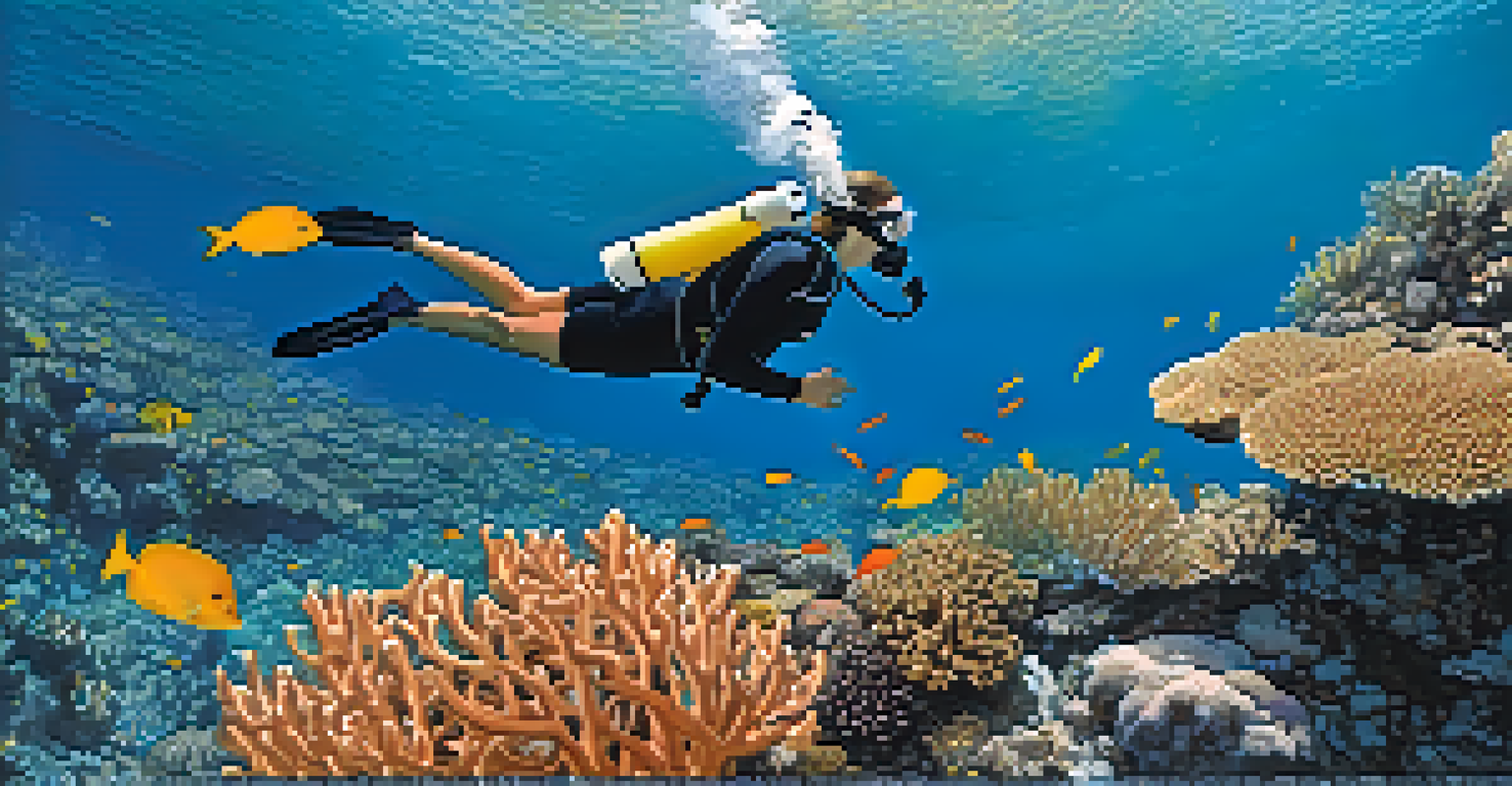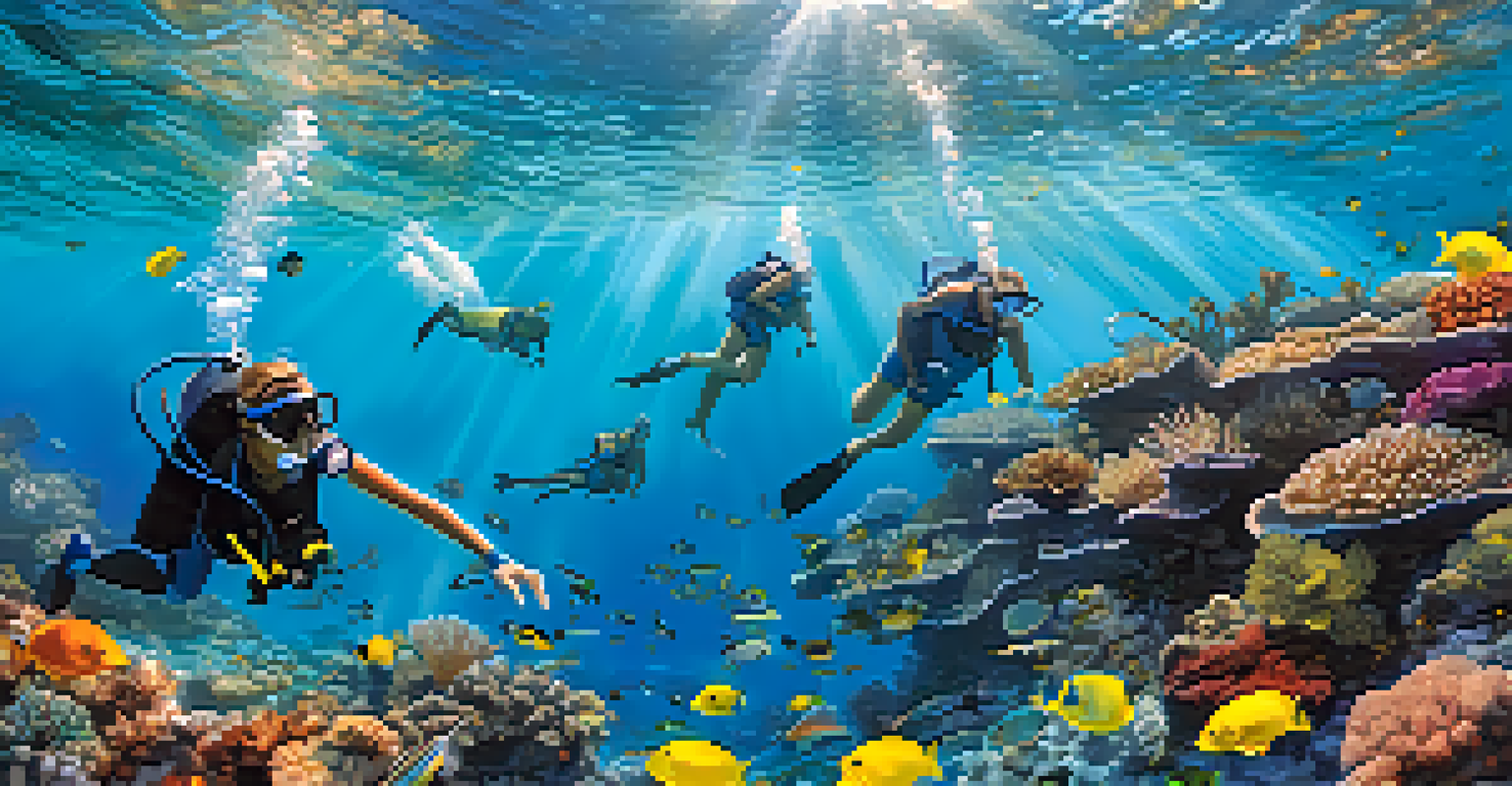A Guide to Responsible Snorkeling in Thailand's Coral Reefs

Understanding the Importance of Coral Reefs
Coral reefs are often referred to as the 'rainforests of the sea' because of their rich biodiversity. They provide habitat for countless marine species and play a crucial role in the overall health of ocean ecosystems. In Thailand, these vibrant underwater landscapes attract snorkelers from all over the world, making it essential to protect them.
The greatest threat to our planet is the belief that someone else will save it.
These ecosystems not only support marine life but also benefit local communities through tourism and fishing. When we snorkel responsibly, we help ensure that future generations can enjoy the beauty of coral reefs. Understanding their importance is the first step in becoming a responsible snorkeler.
By appreciating what makes these reefs so vital, we can make informed choices that minimize our impact. With the right approach, we can experience the wonders of Thailand’s reefs while contributing to their preservation.
Best Practices for Responsible Snorkeling
To snorkel responsibly, start by choosing reputable tour operators who prioritize eco-friendly practices. They often have guidelines in place to protect marine environments and educate their guests. This way, you can enjoy your snorkeling adventure while ensuring you're part of the solution.

It's also essential to respect marine life by observing from a distance. Touching or feeding fish can disrupt their natural behavior and harm the delicate balance of the ecosystem. Remember, you're a visitor in their home, so treat it with care.
Coral Reefs Are Vital Ecosystems
Coral reefs, often called the 'rainforests of the sea,' are crucial for marine biodiversity and local economies.
Additionally, consider using reef-safe sunscreen to protect the coral from harmful chemicals. This small change in your routine can have a significant positive impact on the health of the reefs you visit.
The Impact of Coral Bleaching
Coral bleaching occurs when corals become stressed due to changes in temperature, light, or nutrients, leading them to expel the colorful algae living in their tissues. This phenomenon poses a severe threat to coral reefs, and understanding it helps snorkelers appreciate the fragility of these ecosystems. By recognizing the signs of bleaching, snorkelers can avoid areas that are particularly vulnerable.
In every walk with nature, one receives far more than he seeks.
In Thailand, rising sea temperatures and pollution are significant contributors to coral bleaching. Awareness of these issues can encourage snorkelers to take actions that support reef health, such as avoiding plastic waste and participating in conservation efforts.
If you encounter bleached corals during your snorkeling adventure, take this as an opportunity to reflect on the importance of conservation. Sharing the knowledge about coral bleaching with fellow snorkelers can amplify the message of environmental stewardship.
Equipment and Gear Considerations
Choosing the right snorkeling gear can enhance your experience while minimizing your environmental impact. Opt for high-quality equipment that fits well, as poorly fitting gear can lead to discomfort and potentially harmful interactions with the reef. Many rental shops offer eco-friendly options, so ask about sustainable choices.
When using fins, be cautious of your movements. Try to swim over sandy areas rather than directly over the reef to avoid accidentally damaging delicate corals. Being mindful of your gear and movements can significantly contribute to responsible snorkeling.
Practice Responsible Snorkeling
Engaging in eco-friendly snorkeling practices, such as choosing the right tour operators and using reef-safe sunscreen, helps protect fragile marine environments.
Lastly, remember to secure your belongings properly. Items that fall into the water can create pollution, which further harms marine life. A little preparation goes a long way in ensuring a responsible snorkeling trip.
Participating in Coral Conservation Efforts
Engaging in coral conservation efforts can be a rewarding way to give back to the environment. Many organizations in Thailand offer programs where snorkelers can participate in reef clean-ups or coral planting initiatives. By contributing your time, you’ll not only help the reefs but also gain a deeper understanding of marine ecosystems.
Participating in these activities can enhance your snorkeling experience, allowing you to connect more personally with the underwater world. It’s incredible to witness firsthand the impact of your efforts on coral recovery and marine life.
Moreover, sharing your experiences on social media can inspire others to take part in conservation. When people see your journey, they may be encouraged to act responsibly during their own snorkeling adventures.
Choosing Responsible Tour Operators
Selecting the right tour operator is crucial for ensuring a responsible snorkeling experience. Look for companies that prioritize eco-friendly practices, such as limiting group sizes and providing educational briefings before snorkeling. These operators often emphasize the importance of marine conservation, making your adventure more meaningful.
Reading reviews and seeking recommendations can also help identify operators that align with your values. Engaging with companies that demonstrate a commitment to protecting coral reefs means your snorkeling experience will contribute to the health of these ecosystems.
Join Conservation Efforts
Participating in coral conservation initiatives not only aids in environmental recovery but also enriches your snorkeling experience.
Don’t hesitate to ask questions about their conservation policies before booking. A responsible operator will be happy to share their practices and initiatives, ensuring you make an informed choice.
Respecting Local Cultures and Communities
While snorkeling in Thailand, it’s essential to respect local cultures and communities. Understanding the cultural significance of marine resources to local inhabitants can deepen your appreciation of the area. Engaging with communities in a respectful manner will enhance your experience and foster goodwill.
Consider supporting local businesses by purchasing souvenirs or dining at family-run restaurants. This not only contributes to the local economy but also strengthens the relationship between tourists and residents. Respecting cultural norms and traditions creates a positive atmosphere for everyone involved.

By being a mindful traveler, you help maintain the beauty of Thailand’s coral reefs and the communities that thrive alongside them. Your actions can set a powerful example for other visitors, promoting a culture of respect and conservation.